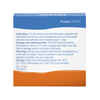Previcox (Firocoxib) - NSAID Tablet for Dogs


Prescription required.
Learn more
Don’t have a veterinarian? Book an appointment with Vetster
 Temporarily Out of Stock
Temporarily Out of Stock
 Thank you, we will notify you when this product is available.
Thank you, we will notify you when this product is available.
Prescription required.
Learn more
Don’t have a veterinarian? Book with Vetster


What is Previcox?
PREVICOX® (firocoxib) for Dogs is a nonsteroidal anti-inflammatory drug (NSAID) used to control pain and inflammation associated with osteoarthritis. It is also indicated for the control of postoperative pain and inflammation associated with soft-tissue and orthopedic surgery in dogs. PREVICOX® anti-inflammatory is safe for dogs when used according to the prescribing directions provided by your veterinarian. Be sure to precisely give the dosage prescribed and don’t give your dog PREVICOX® anti-inflammatory more frequently than instructed. This product cannot be accurately dosed in dogs less than 12.5 pounds in body weight. As with all medications, side effects are possible, so talk to your veterinarian if you suspect or notice an adverse reaction of any kind. Please also refer to the Prescribing Information.
For:
Dogs (7+ weeks of age)
Benefits:
- A flavored chewable tablet makes administering medication easier
- Can be given with or without food
- Fast acting
How does Previcox work?
Previcox works by inhibiting the COX-2 (cyclooxygenase-2) enzyme which generates chemicals that are responsible for pain, inflammation and even fever in the body.
Cautions:
Before giving your dog any other prescription or over-the-counter medications talk to your veterinarian or pharmacist. Keep this medication away from children and pets.
Brand Name:
Previcox (Boehringer Ingelheim)
Generic Name:
Firocoxib (fie-roe-cox'-ib)
What is the most important thing I should know about Previcox?
Previcox is a prescription medication that is FDA approved for use in dogs 7 weeks of age or older. Previcox is available as 57 mg and 227 mg chewable, scored tablets. Contact the veterinarian if the pet has hives; or an allergic reaction after taking sulfa-based medications such as SMZ/TMP, aspirin or another NSAID such as Rimadyl. Notify your veterinarian immediately if your pet develops abdominal pain; tenderness or discomfort; nausea; bloody, black or tarry stools; water retention; fatigue or lethargy; skin rash; itching; yellowing of the eyes; unusual bruising or bleeding as these symptoms could be early signs of dangerous side effects. Before giving your pet any prescription or over the counter medications check with your veterinarian or pharmacist. PREVICOX® anti-inflammatory is designed and approved specifically for dogs. As such, people should not take PREVICOX® NSAID nor administer it to any animal other than a dog as prescribed by your veterinarian. Keep PREVICOX® anti-inflammatory and all medications out of the reach of children. Call your physician immediately if you or a member of your family accidentally ingests PREVICOX® NSAID. For any specific product questions, please call the Boehringer Ingelheim Animal Health toll-free customer service line number at 1-888-637-4251.
What should I discuss with my veterinarian before giving Previcox to my pet?
Tell your veterinarian if your pet has an allergy to aspirin or any other NSAID. Also inform your veterinarian if your pet has an ulcer or bleeding in the stomach, liver or kidney disease, congestive heart failure, fluid retention, bleeding disorders, heart disease or high blood pressure. Tell your veterinarian if your pet is pregnant or lactating. Tell your veterinarian if your pet is taking a steroid medication such as prednisone, methylprednisolone or Prednisolone. Talk with your veterinarian about: The signs of canine osteoarthritis you have observed in your dog, such as limping or stiffness, the importance of diet, weight management and an exercise/activity plan in the management of osteoarthritis in dogs, what tests might be done before PREVICOX® NSAID is prescribed, how often your dog may have to be examined by your veterinarian, the risks and benefits of using PREVICOX® anti-inflammatory. Tell your veterinarian if your dog has ever had one or more of the following medical problems: Any side effects from taking PREVICOX® anti-inflammatory or other NSAIDs, any digestive upset (vomiting and/or diarrhea), any kidney disease, any liver disease. Tell your veterinarian about: any other medical problems or allergies that your dog has now or has had in the past, all medicines that you are giving or planning to give your dog, including those you can get without a prescription and any dietary supplements.
How should Previcox be given?
Give your dog precisely the amount of PREVICOX® anti-inflammatory prescribed by your veterinarian. Be sure to follow your veterinarian’s instructions carefully and do not exceed the dosage or administer PREVICOX® NSAID more frequently than directed. Your veterinarian may prescribe PREVICOX® anti-inflammatory for dogs for short-term use or as a long-term pain and inflammation treatment. PREVICOX® anti-inflammatory should be given according to your veterinarian’s instructions. Do not change the way you give PREVICOX® NSAID to your dog without first speaking with your veterinarian. Your veterinarian will tell you what amount of PREVICOX® anti-inflammatory is right for your dog and for how long it should be given. Most dogs will take PREVICOX® NSAID chewable tablets from your hand, but you can also place the tablet directly into your dog’s mouth. PREVICOX® anti-inflammatory may be given with or without food.
What are the potential side effects of Previcox?
PREVICOX® anti-inflammatory, like any NSAID, may cause some side effects. The most common side effects associated with PREVICOX® anti-inflammatory therapy involve the digestive tract (vomiting and decreased food consumption). Liver and kidney problems have also been reported with the use of NSAIDs. Look for the following side effects that may indicate your dog is having a problem with PREVICOX® anti-inflammatory or may have another medical problem in addition to osteoarthritis: Vomiting, change in bowel movements (such as diarrhea or black, tarry, or bloody stools), change in behavior (such as decreased or increased activity level, lack of coordination, seizure, or aggression), yellowing of gums, skin, or whites of the eyes (jaundice), change in drinking habits (frequency or amount consumed), change in urination habits (frequency, color, or smell), Change in skin (redness, scabs, or scratching), Unexpected weight loss. It is important to stop treatment and contact your veterinarian immediately if you think your dog has a medical problem or side effect while taking PREVICOX® anti-inflammatory tablets. Please also refer to the Prescribing Information. Your dog should not be given PREVICOX® anti-inflammatory if he/she: has had an allergic reaction to firocoxib, the active ingredient in PREVICOX® NSAID, has had an allergic reaction (such as hives, facial swelling, or red or itchy skin) to aspirin or other NSAIDs, is presently taking aspirin, another NSAID, or corticosteroids, is under 12.5 pounds in body weight. PREVICOX® anti-inflammatory does not make dogs sleepy, but other side effects can occur. The most common side effects associated with PREVICOX® NSAID include vomiting and decreased food consumption. Persistent vomiting, weight loss or a change in stools, skin, behavior or drinking habits may indicate a serious reaction. Contact your veterinarian if you notice any concerning side effects—including lethargy—and seek immediate medical help for a serious reaction.
What happens if I miss giving a dose of Previcox to my pet?
Give the missed dose as soon as you remember. However, if is almost time for the next regularly scheduled dose, skip the missed dose and take the next one as directed. Do not give a double dose of the medication.
What happens if I overdose my pet on Previcox?
Consult your veterinarian immediately if your dog consumes more than the prescribed amount of PREVICOX® anti-inflammatory.
What should I avoid while giving Previcox to my pet?
Many over the counter cough, cold, allergy and pain medicines contain aspirin or other NSAID's similar to Previcox. Before taking any prescription or over the counter medications talk to the veterinarian or pharmacist.
What other drugs will affect Previcox?
PREVICOX® anti-inflammatory should not be given with other NSAIDs (for example, aspirin, carprofen, etodolac, deracoxib, meloxicam, or tepoxalin) or corticosteroids (for example, prednisone, cortisone, dexamethasone, or triamcinolone). Tell your veterinarian about all medications that you have given your dog in the past, and any medications that you are planning to give. This should include other medicines that you can get without a prescription or any dietary supplements. Your veterinarian will want to determine which, and if, of your dog’s medicines and supplements can be given together.


Previcox Directions:
- Previcox is a prescription medication.
- Previcox is given once a day.
- Previcox can be given with or without food.
- Previcox is for dogs only. Do not give to cats.
Keep plenty of water available for your pet to drink.
Previcox Dosage for Dogs/Puppies: (7+ weeks of age)
| Weight | Dosage |
|---|---|
| All weights | 2.27 mg/lb of dog's weight once a day for osteoarthritis pain and inflammation |
| Cats |
|---|
| Do not use! |
| Horses |
|---|
| Do not use! |
Store Previcox at room temperature, away from moisture and heat. Keep this medication away from children and pets.


Previcox Ingredients:
| Active Ingredient (per chewable tablet) | Amount |
|---|---|
| Firocoxib | 57 mg |
| Active Ingredient (per chewable tablet) | Amount |
|---|---|
| Firocoxib | 227 mg |


 Swipe
Swipe
 AutoShip
AutoShip
 AutoShip
AutoShip
Customers also boughtView All
 Swipe
Swipe






























































 Would recommend
this product
Would recommend
this product









